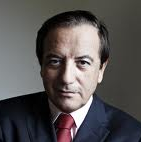Tremors across Europe
Instead of Brussels, Europe is again led by a handful of core economies – Germany, France, UK, Italy and Spain – that collectively account for more than 70 percent of the European economy.
In Germany, Chancellor Merkel’s conservatives and social-democrats retained their dominant position in the European elections, but a new Euroskeptic party, the Alternative for Germany, took 7 percent of the vote, while the neo-Nazi NPD garnered 1 percent. But the political role of the two will remain marginal.
In France, Prime Minister Manuel Valls called the election results “an earthquake” because Marine Le Pen’s National Front garnered 25 percent of the vote and left behind both the conservative UPM and President Hollande’s socialists. In view of past polls, the results were hardly a surprise. Unlike her notorious father, Marine Le Pen has skillfully kept distance to the extreme right, while coopting much of the mainstream vote.
In Britain, the UK Independence Party led by Nigel Farage won 28 percent of the vote. UKIP’s victory reflects a once-in-a-century triumph against the Conservatives and the Labor. If Brussels found Prime Minister Cameron too euroskeptical in the past, it will find him even more critical in the future. UKIP’s triumph has decimated liberal democrats have been decimated, and even Ed Miliband’s role in Labor is threatened.
In Italy, Matteo Renzi’s win has been seen as a triumph of moderate Europe. In reality, he is known as Il Rottamatore (the scrapper): he wants to placate Rome’s “old ruling class.” After he has beaten the more-of-the-same Christian-Democrats, ex-comedian Beppe Grillo’s Five Star Movement, and Berlusconi’s conservative Forza Italia, his center-left Partito Democratico can force economic and institutional reforms, starting in July when Italy will take over the EU Council’s rotating presidency
In Spain, the two main parties failed for the first time to get a combined 50 percent of the votes, thanks to the gains by Podemos (“We Can”), which opposes austerity cuts and demands fairer wage distribution. Led by the academic Pablo Iglesias Turrión, it is a bottom-up movement, which is dominated by two leftist parties but comprises some 25 fringe parties. It has been influenced by the ideas of Juan Carlos Monedero, who served as a sympathetic but occasionally critical advisor of Hugo Chávez.
But what do Europe’s new leaders want?
Away from US laissez-faire and bandwagoning
While French and German socialists understand the need for structural reforms, they support only reluctantly the austerity obsession, which has caused mass unemployment, new debt and lingering growth in Europe.
With the biggest victory in Italy in some 50 years, Renzi will push for a shift of course in Europe. While Brussels demands tough austerity programs, Renzi hopes to focus on a lower deficit, but slow the schedule for debt-reduction.
In Washington, Europe’s rising leaders have been demonized as “populists” and “hate-mongers.” In reality, it is the approach of the new European leaders toward America and Russia that makes Washington uncomfortable (and could offer a new opportunity window to Beijing).
In France, Marine Le Pen and the National Front have demonstrated how much a broad protest can achieve. Unlike Geert Wilders in the Netherlands, she is not waging “war against Islam” or “fighting the Islamization of French society.” Her predominant political theme has been a protective and strong state that favors secularism, prosperity and liberties.
In foreign policy, she would like to pull France out of NATO. She believes in the idea of the “multipolar world” and would like France to revise its geostrategic relations with the US, particularly Sarkozy-style bandwagoning.
An advocate of more effective corporate tax and lower taxation for small-and-medium size enterprises, Le Pen denounces the “Europe of Brussels,” supports protectionist measures, and opposes unbridled free trade, supranationalism, the euro and the Eurozone. Like her counterparts, she believes that old institutions, such as the World Trade Organization, World Bank and International Monetary Fund have been “expired.”
Multipolar Euroskeptic Union?
The protest Europe’s fascination with Russian President Putin is usually explained by autocratic inclinations. But the realities are more complex.
Marine Le Pen advocates a privileged partnership with Russia, which is necessitated by “obvious civilization and geostrategic factors” as well as “energy security interests.” She believes there is an ongoing process of demonization of Russia and Putin at Brussels and Washington, which are “trying to create a unipolar world.”
Le Pen’s foreign policy advisor Aymeric Chauprade, former lecturer at the Joint Defense College (who reportedly was sacked in a controversy about 9/11 conspiracy theories), supports French geopolitics and advocates a return to realpolitik. He supports a union of sovereign states and a policy of compromise with Russia within an “Eurasian alliance,” and the idea of a multipolar word, including a balanced relationship between China and the US.
Le Pen and Chauprade would like to severe French ties with Saudi Arabia, “America’s best ally” and support closer ties with Iran. They think that the US-Saudi alliance seeks to destroy moderate Arab regimes that are trying to modernize Islam. Like UKIP’s Lafarge, Le Pen often demanded Paris to withdraw its troops from Afghanistan. She rejected efforts to involve France in the Libyan conflict and has denounced the “US supremacy” and Atlanticist interventions. Like Charles de Gaulle, she seeks independence toward US.
These ideas have triggered concern in Washington, which had hoped to complete the EU-US free trade agreement (FTA).
From China’s standpoint, the new approach toward multipolarity is reminiscent of Chirac’s ideas over a decade ago. Of course, the Euroskeptics also support protectionism in trade and investment, but they would also favor bilateral talks – which are Beijing’s preference as well.
“Less Europe” Brussels
Europe’s pent-up political protest has been fueled by severe social dislocations across Europe, particularly in Southern economies, and ill-advised obsession with austerity at the expense of inclusive growth policies.
Instead of “more Europe,” the new parties want to foster sovereign states and a looser federation. Most would be glad to receive more Chinese capital as long as it won’t interfere with their sovereignty and way of life.
After the May elections, the center-right European People’s Party (EPP) and social democrats (S&D) still dominate 54 percent of the seats, while the liberal-centrists (ALDE/ADLE) and the greens have barely 16 percent. While fringe moderates lost dramatically, the two large parties still have almost 70 percent of all seats.
European integration did not die, but took a heavy hit. In the process, the share of independents soared to almost 14 percent. Meanwhile, the left-green socialists, Euroskeptics (ECR) and far right anti-Federalists (EFD) beat the moderate fringe groups accounting for 17 percent of the vote.
With a turnout of just 43 percent, the election’s bottom line is clear. The political middle remains in majority, but its bargaining power has been squeezed. Moderate right and left may agree on further integration, but neither alone can achieve a simple majority.
In the coming months, the moderate middle hopes to coopt the protest parties, while the latter hope to tax the incumbents’ support. Of course, European decision-making should now be decisive, fast and consolidated. But that’s precisely what’s not going to happen. Instead, strong consensus may be replaced by fragmented sectarian struggles.
In the Obama White House, a Euroskeptic Union represents pretty much everything the Administration rejects. In Beijing, the Euroskeptics are seen as a force that could potentially contribute positively to a new balance of international power. But both wonder how far Europe’s protest will go.
Dr. Dan Steinbock is Research Director of International Business at India China and America Institute (USA) and Visiting Fellow at Shanghai Institutes for International Studies (China) and the EU Center (Singapore). For more see http://www.differencegroup.net

